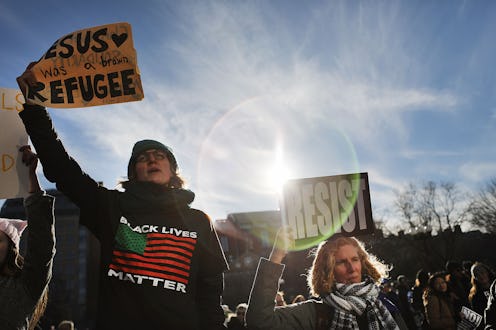News
Why You Actually Shouldn't Protest Any Trump Rally

President Trump plans to hold a campaign-style rally in Florida on Saturday; given his affinity for large crowds of people cheering his name, this isn't a surprise. It's also no surprise that some on the left are planning to protest the rally, and while this is a well-intentioned idea, it's also a very bad idea. You actually shouldn't protest any Trump rally — at least, not in the immediate vicinity of the the rally itself.
Why? Because doing so could very easily empower Trump to accomplish the exact things you'd be protesting against. Protests are an absolutely necessary part of any democracy, but they're also unpredictable and uncontrollable. They don't always turn violent, but sometimes they do — and if an anti-Trump rally were to become violent, this would play directly into Trump's hands.
Trump has been depicting liberal protesters as violent thugs for over a year, and has at points encouraged his supporters to physically attack protesters. If there's even a hint of a physical altercation at an anti-Trump rally — regardless of who instigates it — that will appear, in the eyes of some people, to confirm Trump's warnings. The last thing #TheResistance needs is a president who feels emboldened to take action against lawful protests and public demonstrations against his rule.
Of course, there are plenty of other ways protest Trump that don't involve showing up at his events. The Women's March was a beautiful example of this: A counter-rally, held the day after Trump's inauguration, that was free of trolls, infiltrators, or anything that gave Trump an excuse to crack down on public demonstrations. It made the dissent's voice clear, and didn't attract any blowback from the pro-Trump crowd.
With regard to the Florida event, the calculus would be much different if Trump himself weren't holding the rally. When demonstrators at UC Berkeley protested against a planned speech by Milo Yiannopoulous in January, they had a concrete goal in mind: Prevent a marginal but up-and-coming figure in the alt-right, one with a documented history of bigotry, from widening his audience. That's a laudable goal, and the strategy worked —the university was forced to cancel Yiannopoulous' appearance.
But this logic doesn't apply to Trump. He's the President of the United States, and thus already has both the largest audience imaginable and more power than almost anybody on the planet. Protesting at his rallies won't do anything to slow his influence or spread, and it certainly won't accomplish anything that could be accomplished by holding a counter-rally a few blocks away.
Lastly, it's worth noting that efforts to protest Trump's Florida rally have been promoted by @RoguePOTUSStaff, a controversial Twitter account purporting to be a contingent of "rogue" staffers in the White House. However, some believe that this account is actually a sophisticated pro-Trump troll, and British journalist Louise Mensch has presented some compelling evidence to suggest that this is the case. Nothing is for certain, but it's certainly worth consideration if you're thinking about protesting Trump in Florida.
In all likelihood, anti-Trump protests will be a regular occurrence for as long as he's in office and considering how unpopular Trump is with the American people, that's a good thing. But not all protests are equally effective, and some have the potential to backfire spectacularly. Such is the case with Trump's Florida rally, and any other rallies he may hold. Trump has already spoken disdainfully of Americans who demonstrate against him; let's not give him an excuse to act on this disdain.